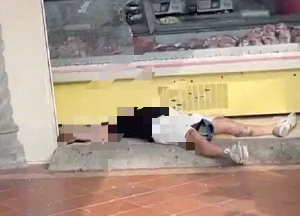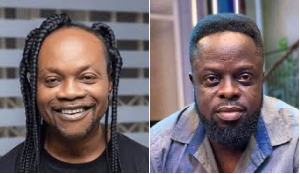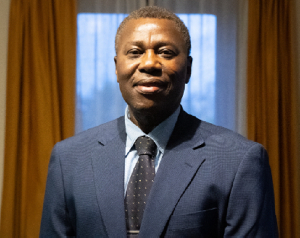Ghana
Gliding
…Along Failed State
The aL-hAJJ, in a publication in our Thursday, June 4, 2015 edition expressed concern over ongoing unhealthy practices in the country where people who commit all manner of crimes virtually walk away "free" simply on account of their association with either of the two dominant political parties, the ruling National Democratic Congress or the largest opposition New Patriotic Party.
This detrimental practice, among other things we observed, was steadily sliding Ghana into a state of anarchy and chaos and until immediate action was taken to halt it, the country could, within the next 10-15 years, join the undignified club of failed states.
Though this phenomenon may have began when the country returned to constitution rule in 1992, it is now assuming very disturbing dimension and it is almost being institutionalized as the security services have become hapless and incapacitated dealing with rogues hiding under the colour of being associates of the two leading political parties.
Suffice to mention that most of the ills inundating this country are largely home-grown. They are home grown due to the fact that the problems are either, self induced, self inflicted and/or lack of political will in dealing with them.
And, it's just a matter of time we all may have to live with its disastrous consequences if all of us; the people, government and state institutions do not resolve to arrest this cancerous tumor in our body polity.
The Wednesday, June 3, 2015 twin flood/fire disaster that claimed the lives of over 160 people and destroyed properties running into millions of Ghana cedis at Kwame Nkrumah circle and other parts of the city is still fresh in our minds. But as usual, and Ghanaians as we are, instead of us resolving 'never again' should we allow this to happen, it's all about age-long arguments over who to blame. Who did what? Who should have done that or, who didn't do this?
Therefore, President Mahama's call for an end to the blame game after the Wednesday, 3 June flood was timely. Of course, blaming people for the floods and fire will not resolve the problems over night, and certainly, some people must accept responsibility. But, that is us; the people, governments, past and present, and state institutions whose responsibility it is, the enforcement of the country's laws to prevent such misfortunes.
This country has lots of laws that could whip everybody in line to put the country on a pedestal comparable to other successful democratic states on the globe, regrettably however, these laws have been gathering dust on the law shelves and/or, are not operational, giving room for every Tom, Dick and Harry including the state to 'fool around'.
Yes, Ghana may not have reached a point where it could be tagged as a failed state, however, if the signs on the wall, of wide spread indiscipline, the disorderliness, the unwillingness of our political class to play by the rules and the gradual break down of law and order is anything to go by, it shouldn't surprise us all to see this country join the unenviable club of failed states in the shortest foreseeable future.
Since the return to constitutional rule in 1992, under a doctrine known as multi-party democracy, followers of political parties can mass up at security installations to protest and/or demand the immediate release of one of their own, regardless of the merit or otherwise of his, or her case under investigation.
Partisan politics is fast taking over everything in the country to the extent that, very soon, our healthcare delivery and other essential services would be based on party affiliation. The country is now seriously polarized along NDC and NPP divide such that, when the former is in government, supporters and members of the latter party in opposition incessantly pray for the ruling party to fail and vice versa.
In some extreme cases, those in opposition even go unto their knees praying for disaster to hit the nation so they could latch onto it to make capital out of it in order to make government unpopular. They do this to brighten their political chances even if it is at the expense of our national character.
Football, which uses to bind the nation together irrespective of our political, religious and ethnic orientation, has now assumed a disturbing political dimension. Whenever any of the national teams is playing against another country, we have supporters of the largest party in opposition, many a time, supporting the opposing team and more often than not, openly jubilate when our national teams are kicked out of competitions simply because, they believe the government of the day will take the glory to their detriment.
At best, it can be fairly concluded that Ghanaians are fast losing their sense of patriotism especially, since the advent of multiparty democracy in 1992. What everybody is concerned about is how his or her party can win elections and no more about how the country is governed.
Most often, when there is the need for a decision to be taken in the best interest of the state but, the action may lead to a ruling party suffering electoral loss, that decision is hurriedly shelved. And this has happened times without number under NDC or NPP administrations. A classical example is how vulcanizers, hawkers, wielders, scrap dealers and chop bars operators among others have taken over streets in the nation's capital and other cities in the country, operating with impunity.
On the streets of Accra, for instance, the environment is on daily basis brazenly been degraded, while animals, including cattle, sheep and goats, roam the streets, even to the extent that the so-called ceremonial routes also suffer this fate.
Ironically, the country’s securities have been rendered impotent by the political class to deal with this menace. There is no dearth of statutes or regulations on our books. If there is a challenge, then it has to do with their enforcement. Indeed, Ghana has all the laws banning these unhealthy practices but their implementation remains the problem.
This has led to huge vehicular traffic with its attendant indiscipline on most roads in the country and one should imagine how the country, particularly its roads, will look like in the next 10 to15 years if remedial measures are not put in place, including the enforcement of laws to the latter.
In all of these, it is important to point out that some action has been taken in the past to give the country a befitting outlook. But these have been sacrificed on the altar of politic expediency. It would be recalled when former Mayor of Accra in the NPP era, Stanley Nii Adjiri Blankson decided to take that bold step to decongest the city of Accra, a mere phone call from the then seat of government at Osu stopped the whole exercise.
The current Mayor of Accra, Dr Afred Oko Vanderpuije suffered similar fate and indeed, was nearly ousted for earmarking several buildings standing on waterways and at illegal place for demolition. As a result of this, even railway lines are brazenly being encroached upon when this offends the country's laws on sitting structures along railway lines.
Ominously, it has time and again emerged that government is the principal culprit when it comes to breaking laws in Ghana. Currently, government has been in months of default in several statutory payments. Aside this, government’s own actions and inactions have resulted in breaking laws without regards to the consequences.
Opinions of Tuesday, 16 June 2015
Columnist: Al-hajj














